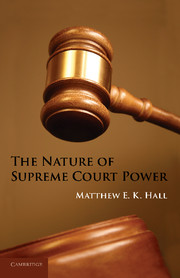Book contents
- Frontmatter
- Contents
- List of Figures
- List of Tables
- Preface
- 1 Neither Force, Nor Will
- 2 When Courts Command
- 3 Judging the Court
- 4 Popular Vertical Issues
- 5 Unpopular Vertical Issues
- 6 Popular Lateral Issues
- 7 Unpopular Lateral Issues
- 8 Neither the Sword nor the Purse, but the Keys
- Appendix I Case Selection
- Appendix II Survey Information and Citations
- Appendix III Supporting Data for Figures
- Appendix IV Statistical Analysis on the Effects of the Pico Ruling
- Appendix V Behavior Conformity Calculations
- Appendix VI Statistical Analysis of Behavior Conformity
- Appendix VII The Effects of Unanimity on Behavior Conformity
- Case References
- References
- Index
Appendix I - Case Selection
Published online by Cambridge University Press: 06 December 2010
- Frontmatter
- Contents
- List of Figures
- List of Tables
- Preface
- 1 Neither Force, Nor Will
- 2 When Courts Command
- 3 Judging the Court
- 4 Popular Vertical Issues
- 5 Unpopular Vertical Issues
- 6 Popular Lateral Issues
- 7 Unpopular Lateral Issues
- 8 Neither the Sword nor the Purse, but the Keys
- Appendix I Case Selection
- Appendix II Survey Information and Citations
- Appendix III Supporting Data for Figures
- Appendix IV Statistical Analysis on the Effects of the Pico Ruling
- Appendix V Behavior Conformity Calculations
- Appendix VI Statistical Analysis of Behavior Conformity
- Appendix VII The Effects of Unanimity on Behavior Conformity
- Case References
- References
- Index
Summary
The most complicated criterion in my case selection process is my attempt to avoid division of labor cases by focusing on “important” Supreme Court rulings. This criterion is also critical to the relevance of my project. Understanding conditions under which the Court is capable of altering behavior is only important when the Court is issuing rulings that are important. If scholars, politicians, the media, and the public do not care about the issues at stake in a ruling, then they probably will not care about the Supreme Court's power to affect those issues. But how do we objectively identify which rulings are “important” and which are not?
To accomplish this task, I borrow methodology developed by David Mayhew for identifying “important” federal legislative enactments in his work, Divided We Govern (2005). I also borrow Mayhew's definition of importance: “In principle, the term ‘important’ will connote both innovative and consequential – or if viewed from the time of passage, thought likely to be consequential” (2005, 37). Mayhew conducts two searches for “important laws enacted”: Sweep One, which utilizes “judgments that close observers of each Congress made at the time about what enactments, without regard for policy area, were particularly notable”; and Sweep Two, which uses “retrospective judgments that policy specialists have made, looking back over many Congresses, about what enactments in their own policy areas have been particularly notable” (Mayhew 2005, 37).
- Type
- Chapter
- Information
- The Nature of Supreme Court Power , pp. 167 - 172Publisher: Cambridge University PressPrint publication year: 2010



